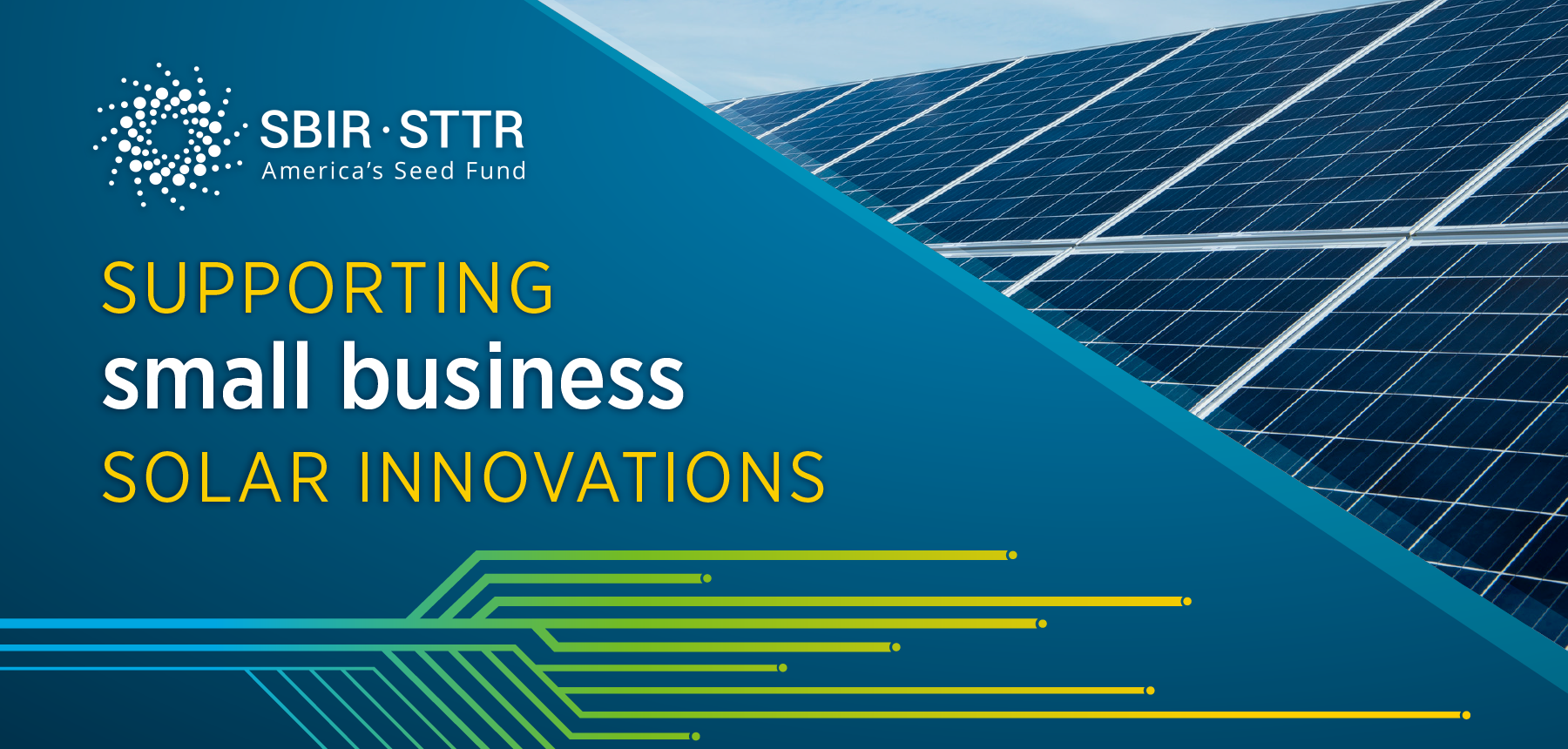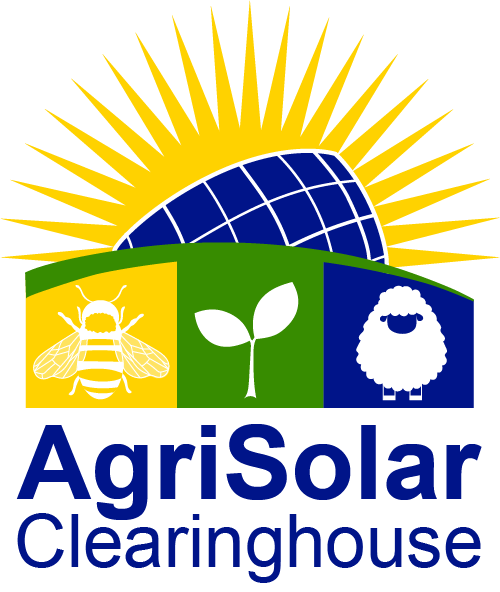staciepeterson
Moderator
SBIR/STTR Phase I awards are up to $200,000 for six months to one year. Details on the topics for the FY 2022 Phase I release are detailed below. View the funding opportunity announcement document for more information on the program, the application process, and eligibility.
This year, the Solar Energy Technologies Office (SETO) is issuing two topics. One is open to both SBIR and STTR applications, while the other is open to only STTR applications. An STTR application requires the small business to partner with a research institution. The research institution must conduct at least 30% of the work, and the principal investigator (PI) can be employed either by the small business or the research institution. Please read the funding opportunity announcement carefully for additional eligibility criteria for each program.
Letters of intent for this funding opportunity are due January 3, 2022, by 5:00 p.m. ET. Along with your business information, the letter of intent must contain a 500-word technical abstract of your innovation.
The American-Made Network Matching Tool is a great resource for finding TABA providers and vendors with specific expertise in the solar space. The Network helps accelerate solar innovations through a diverse and powerful group of entities that includes national laboratories, energy incubators, investors, prototyping and testing facilities, and other industry partners from across the United States who engage, connect, mentor, and amplify the efforts of small businesses. The Network can help companies solve pressing technology challenges, forge connections, and advance potentially game-changing ideas and innovations.
Download the full topic document (PDF).
SETO hosted an informational webinar on Thursday, November 18 to discuss the Phase I solar topics. You can view the webinar recording here (password: jCbY2jVv). Google Chrome is recommended for best results. You can also download the webinar transcript here.
Learn more about SETO’s manufacturing and competitiveness research, sign up for our newsletter, and join the DOE SBIR/STTR mailing list to keep up to date with the latest news.

 www.energy.gov
www.energy.gov
This year, the Solar Energy Technologies Office (SETO) is issuing two topics. One is open to both SBIR and STTR applications, while the other is open to only STTR applications. An STTR application requires the small business to partner with a research institution. The research institution must conduct at least 30% of the work, and the principal investigator (PI) can be employed either by the small business or the research institution. Please read the funding opportunity announcement carefully for additional eligibility criteria for each program.
Letters of intent for this funding opportunity are due January 3, 2022, by 5:00 p.m. ET. Along with your business information, the letter of intent must contain a 500-word technical abstract of your innovation.
Topics open to both SBIR and STTR applications:
SETO seeks solutions in the following subtopics:- Multiuse Integrated Photovoltaic (PV) Systems – technology components and systems that integrate photovoltaic technologies with other energy, agricultural, and built environment systems.
- PV Recycling – new materials, designs, technologies, and practices that can help reduce PV manufacturing’s environmental impact by minimizing waste, energy use, negative effects on human health, and pollution.
- Next-Generation Power Electronics Based on Silicon Carbide and/or Planar Magnetics – power-electronic components and systems that integrate and leverage the greater efficiencies, lower costs, and lower weight of devices based on silicon carbide and gallium nitride.
- Technologies to Integrate Solar Generation with Energy Storage Systems and/or Electric Vehicle Charging – technologies to integrate and optimize distributed energy resources—in particular, PV generation—with energy storage capabilities and infrastructure for electric vehicle charging.
- Concentrating Solar-Thermal Power System Construction, Manufacturing, and Reliability – innovative technologies to engineer and build reliable concentrating solar-thermal power (CSP) plants.
- Solar Hardware and Software Technologies: Affordability, Reliability, Performance, and Manufacturing – solutions that can advance solar energy technologies by lowering cost, increasing domestic content in solar hardware, and facilitating its secure integration into the Nation’s energy grid.
- Technology Transfer Opportunity: Hierarchical Distributed Voltage Regulation in Networked Autonomous Grids – develop and commercialize a product that optimizes real-time dispatch of distributed energy resources.
- Technology Transfer Opportunity: Novel Solar Collector Tracking Error Direction: “NIO-Heliostat” – a non-exclusive license to develop and commercialize a technology to track solar collector error direction on a commercial-scale heliostat field.
Topics open only to STTR applications:
This funding opportunity announcement also includes subtopics where a strong partnership with a research institution is required:- Transferring Novel Solar Technologies from Research Laboratories to the Market – spinning out solutions from research institutions, such as universities and national laboratories.
- Concentrating Solar Power Technologies for Industrial Decarbonization – technology transfer from research institutions to small businesses in the area of industrial thermal and thermochemical processes.
- Next-Generation Solar Forecasting – development and commercialization of the next-generation tools and capabilities to increase accuracy and reliability of solar forecasting.
Technical And Business Assistance (TABA)
We encourage applicants to apply to the Technical And Business Assistance (TABA) Program. It provides additional funding specifically for commercialization activities in addition to the SBIR/STTR research funding. Examples of allowable commercialization services include: product sales, intellectual property protections, market research, market validation, development of certifications and regulatory plans, development of manufacturing plans. If you wish to utilize your own TABA provider(s), you are required to include this as one or more subcontracts or consultants in your budget and to provide a detailed budget justification. Please read the funding opportunity announcement for more information about this program and how to apply for this extra funding.The American-Made Network Matching Tool is a great resource for finding TABA providers and vendors with specific expertise in the solar space. The Network helps accelerate solar innovations through a diverse and powerful group of entities that includes national laboratories, energy incubators, investors, prototyping and testing facilities, and other industry partners from across the United States who engage, connect, mentor, and amplify the efforts of small businesses. The Network can help companies solve pressing technology challenges, forge connections, and advance potentially game-changing ideas and innovations.
Additional Information
Download the Funding Opportunity Announcement document (PDF).Download the full topic document (PDF).
SETO hosted an informational webinar on Thursday, November 18 to discuss the Phase I solar topics. You can view the webinar recording here (password: jCbY2jVv). Google Chrome is recommended for best results. You can also download the webinar transcript here.
Learn more about SETO’s manufacturing and competitiveness research, sign up for our newsletter, and join the DOE SBIR/STTR mailing list to keep up to date with the latest news.

Funding Opportunity Announcement: SBIR/STTR FY 2022 Phase I Release 2
The Small Business Innovation Research (SBIR) and Small Business Technology Transfer (STTR) programs encourage U.S. small businesses to engage in high-risk, innovative research and technology development with the potential for future commercialization.
